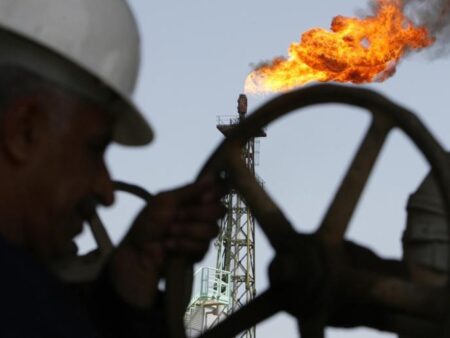Investing.com– Oil prices edged lower Monday, handing back some of the previous week’s strong gains as traders digested reports that Israel was close to a ceasefire with Lebanon militant group Hezbollah.
At 08:50 ET (13:50 GMT), fell 0.6% to $74.22 a barrel, while dropped 0.6% to $70.79 a barrel.
Israel close to ceasefire with Hezbollah – Axios
Israel and Hezbollah were close to signing a ceasefire agreement to end hostilities in Lebanon, Axios reported on Sunday, citing Israeli and US officials. Israel daily, The Times of Israel, also reported that Prime Minister Benjamin Netanyahu was holding high-levels talks over the deal, which was brokered by US officials.
Israeli officials are considering a draft agreement that includes a 60-day transition period where the Israeli military will withdraw from southern Lebanon and Hezbollah will move its heavy weapons north of the Litani River.
The agreement will also see the establishment of a US-led oversight committee.
The prospect of an Israel-Hezbollah ceasefire points to lessened tensions in the Middle East, presenting a lower risk premium for oil. Traders were concerned that any escalation in tensions would disrupt supplies from the oil-rich region.
Ukraine-Russia tensions provide support
That said, oil prices remained close to their highest levels in over two weeks, having risen sharply in recent sessions on heightened tensions between Russia and Ukraine.
Ukraine began using Western-made, long-range missiles to hit targets deeper within Russia – a move that prompted anger from Moscow.
Moscow responded by lowering its threshold for nuclear retaliation, while also striking Ukraine with an experimental hypersonic missile.
“The recent exchanges indicate the war has entered a new and dangerous phase, raising concerns of disruptions to supplies,” ANZ analysts wrote in a note.
OPEC+ to extend production cuts – UBS
Attention will shortly turn to the next meeting of the Organization of Petroleum Exporting Countries and allies, a group known as OPEC+, at the start of next month, where its members will deliberate on production policies.
OPEC+ is likely to extend its production cuts rather than increasing output, according to analysts at UBS.
The Swiss bank noted that current market conditions—characterized by oil prices hovering near the lower end of their trading range—are not conducive to a production increase.
The organization is wary of exacerbating a seasonal surplus in the oil market, a move that could further pressure prices.
The analysts suggest that OPEC+ will likely extend its production cut policy for an additional three months, into the first quarter of 2025, a period traditionally marked by weaker oil demand.
UBS analysts argue this cautious approach provides the alliance flexibility to adjust production in response to unexpected disruptions or stronger-than-anticipated demand later in the year.
(Ambar Warrick contributed to his article.).

















